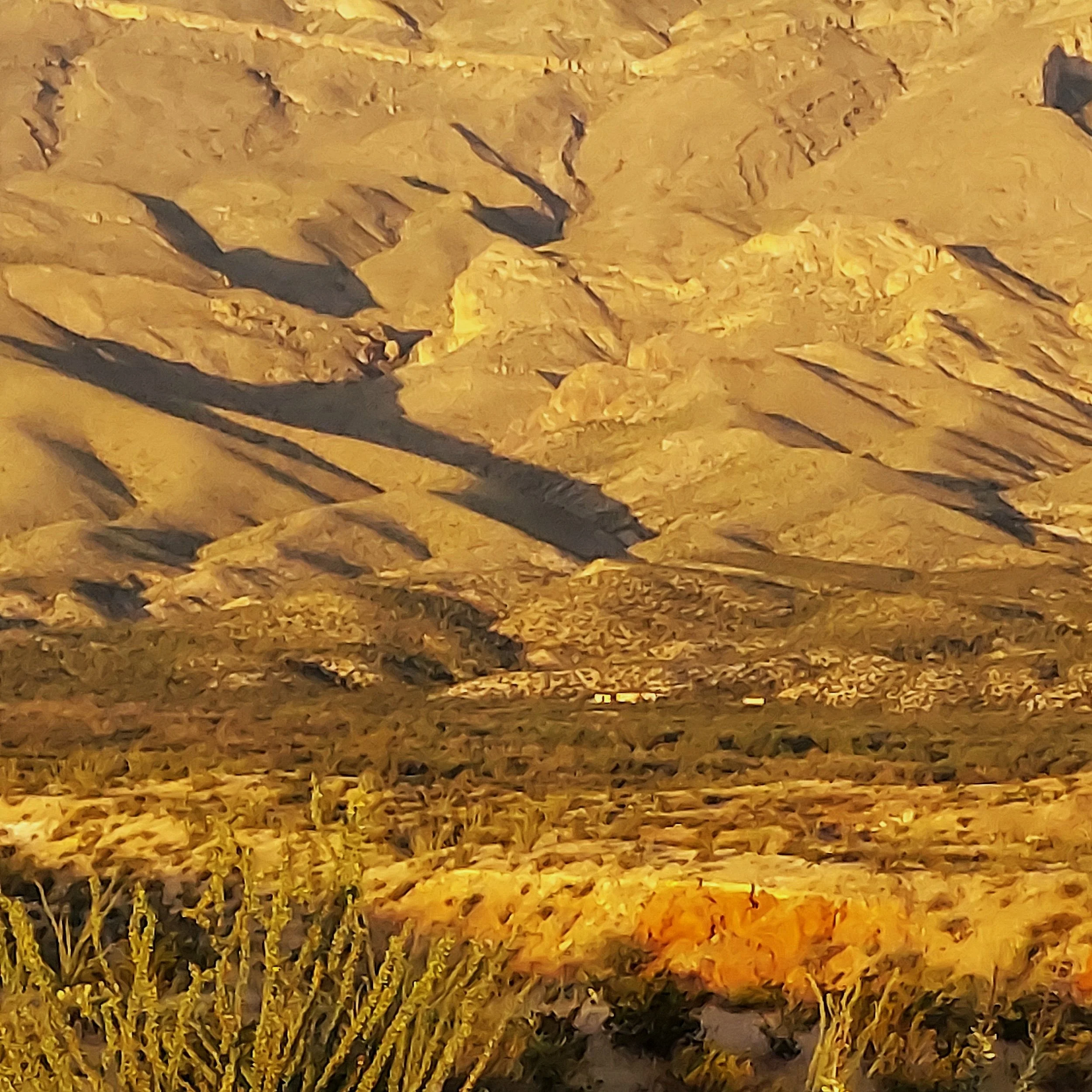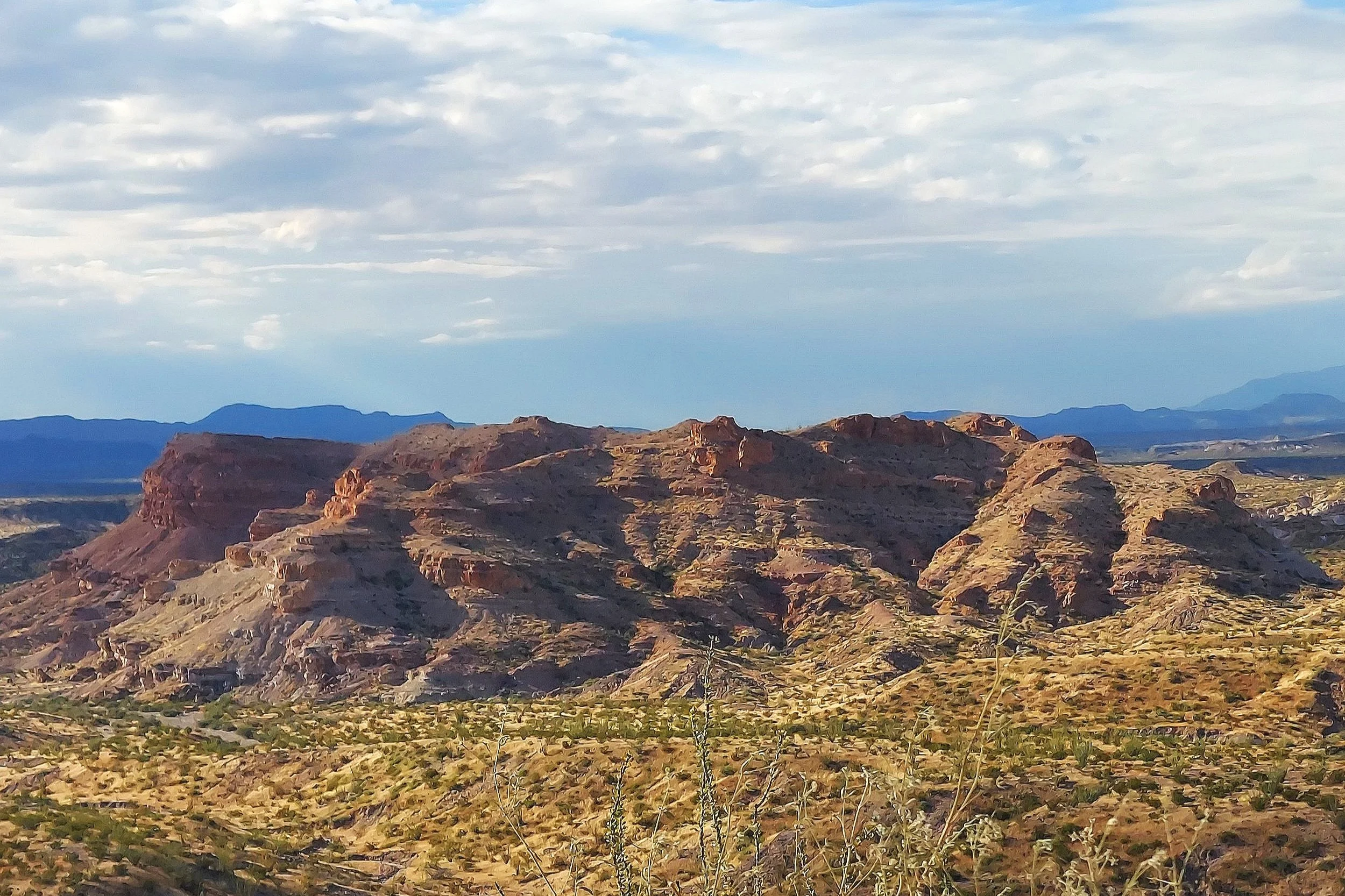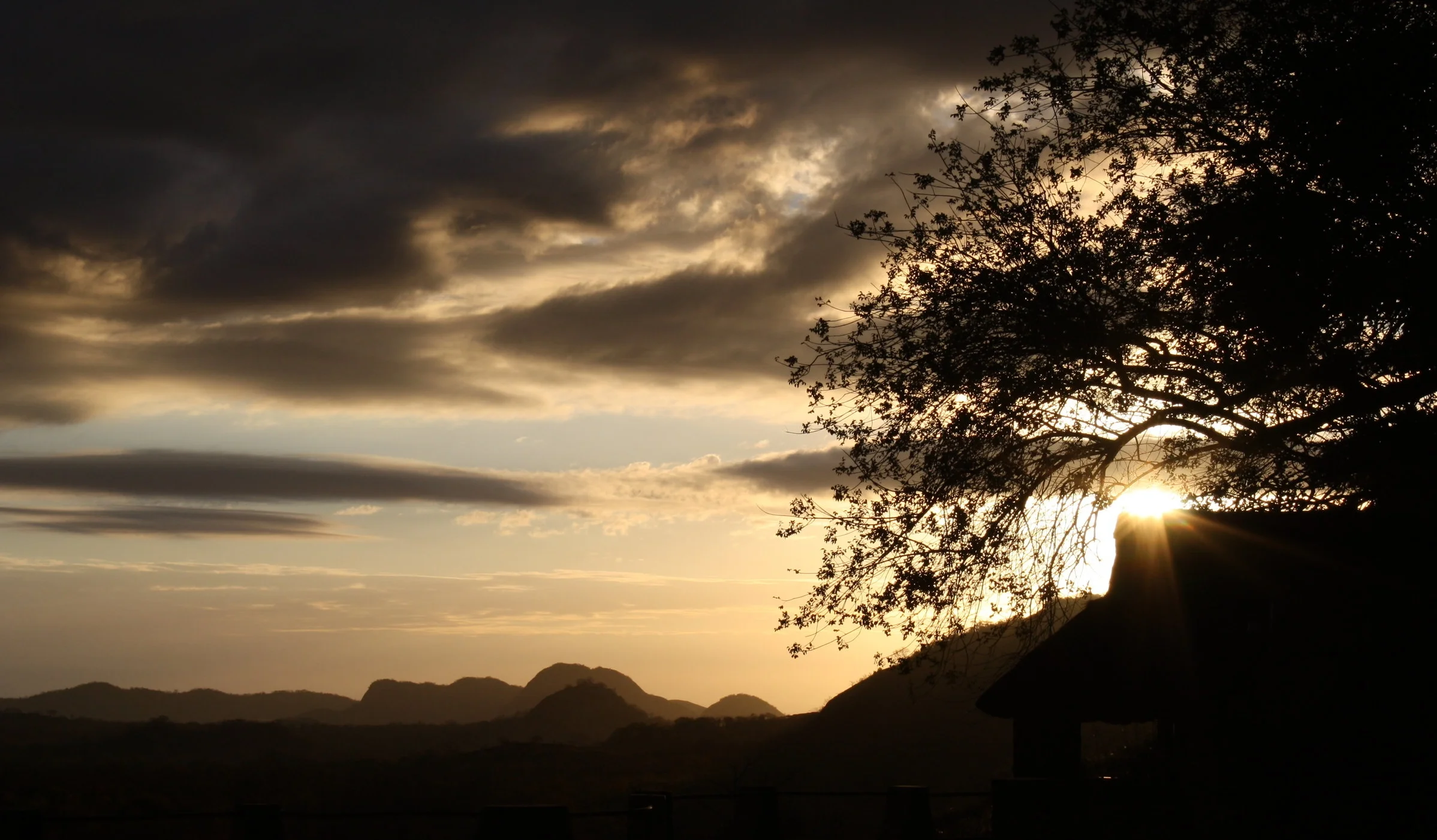Sheep on the Border

We moved through the dark like wanted men on the run. In the gray light before sunrise, we made our perch high up in the rocks. The anticipation of the first morning caused us to stand rigid and glass the dark hillsides and black fissures before first light. As the sun rose so did our expectations. The sunlight crawled across the Earth making visible new ground and each hillside now visible stoked our excitement like a furnace. Our first Barbary Sheep could be anywhere.
With my back to the rising sun, I can see across old Mexico to the southwest just as far as I can glass for sheep to the northwest. The vistas here in West Texas are arresting. You climb to high ground with the intent to glass for sheep, but you find yourself lost in beautiful country. Lost like a tourist and then all at once, you remember why you are here, set your jaw, affirm your purpose, and glass for sheep.
The Rio Grande is anything but grand. Back east, we would debate if the ribbon of water we see is a creek or crick. Nevertheless, the vibrant green valley whose thirst it quenches is broad and expansive. It stands defiant against the remainder of the landscape, which God painted in brown, orange, yellow, and pink.
All seemed to be in order, until our legs grew tired, and we dug into our packs for our chairs. There is not a square yard of Mother Earth here that is not covered by sharp loose rock or cactus. Sitting to glass without a packable chair is a mistake that your arse will pay for, and my brother-in-arms forgot his chair and paid the toll. When the sun is coming up or going down, the yellows, pinks, and oranges of the rocks are contrasted by the turquoises and purples of the sky, and I wonder if the wildlife moves just to see the scene God painted. There is so much that captures our attention for the first few hours and then seemingly all at once it ceases. Nothing moves in the heat of the day here.
When you are hunting the Chugach or the Rocky Mountains people like to say that “The mountains don't care,” or “the mountains won’t give you anything.” These West Texas mountains may not be as tall or vast, but they are dangerous in many ways. On the ridges are sharp loose rocks and piercing cactus. In the fissures, washes, and valleys there is deep soft sand. Those western mountains might not care, nor give you anything, but these West Texas mountains feel like bullies. It feels like I owe them money, as they stick me, cut me, slow me down, and twist my ankles.
There are easier ways to kill a Barbary Sheep, but we did not choose any of those. We decided on one of the hardest hunts we could find for our first attempt. Why? Because success on a hunt like this makes it that much sweeter. This hunt was a do-it-yourself unguided hunt on land we had never seen. Finding, killing, and retrieving a Barbary Sheep was up to us. Sure, we could pay more and would almost be guaranteed a sheep, but that is not our style. We want to earn it. We want to tell our own story. So, we paid a trespass fee to gain access to these abandoned ranches and the sheep that call them home.
We spent the first three days scouring the terrain with binoculars and spotting scopes for sheep. When we moved from peak to peak, we scouted for tracks and other sign. We put in the work, and we found nothing – literally nothing. In camp the third night around the fire, we decided to split up and cover more ground. This gives us a better chance at finding sheep, but it is more dangerous. Leaving the safety and support of your hunting buddy in unfamiliar terrain, and without cell phone signal is more dangerous, but we can cover twice the ground.
I hike in the dark one ridge further and find a recess in the rock that puts me in the shade with the rising sun at my back – perfect. The morning chill has no effect on me. I am shaking from excitement. In my mind, the sheep are going to be everywhere when the sun comes up. I was wrong. The morning comes and goes too fast. All creatures large and small disappear. They already know what we have learned in the last few days. The October days seem pleasant, but in the heat of the day shade and stillness are necessary. The morning hunt is over, and I move to a shady spot to rest and think about the sheep I will find later in the day.
These elusive animals, called Barbary Sheep, are more closely related to goats and antelope. A big ram will weigh about three-hundred pounds. They are an ancient species indigenous to North Africa and are not native to the United States. One of the reasons they are so hard to hunt is that they can literally live on almost nothing. They get all their water from the food they eat, so you cannot sit on a water hole and wait them out. They can subsist on brown scrubby foods and lichen, so they can stay up high in the peaks and make a living. This is why outfitters bait them with corn and alfalfa, effectively getting them to move into the open for a shot. The good news is that they move in small herds, so when we find them there is a good chance a ram will be present.
Walking back to the rendezvous point to meet my hunting buddy Sergeant Major (Retired) Shel Nevels, I focus on the positive. The whole day passes without seeing a sheep, but I am in big, beautiful country, none of the vehicles have broken down, no one's been stung by a scorpion, bit by a snake, or injured. This is the kind of self-motivation and reassurance that happens on any hunt when you have not even seen your quarry. It was dark when I arrive to the road. I hail Shel, when I get in range of his side by side, “Sergeant Major! What did you see?” He does not respond. Then I saw his smile in my headlamp. The news is more relief than excitement. Carter, the youngest member of our hunting party, has seen two rams.
We hustled back to camp and got the full story over a well-earned beer. Carter saw the two rams headed north at last shooting light. They were moving North, feeding, and unaware he was there. This is outstanding news, but there is a catch. The trespass fee we paid to gain legal access to these long-ago abandoned ranches came with rules. We can only take two rams off each ranch. Shel and I have seen zero sheep on our ranch. Now Carter and his father, affectionately called Goat, have a chance at their two. We are happy for them and the promise that tomorrow brings. If they are seeing sheep maybe, we will too.
The next day brought more of the same. On our side of the mountain, we saw no sheep. As the sun set, we hit the rendezvous point, and hiked back to the road talking about the miles we walked, and elevation lost and gained over the week without seeing a sheep. Back at the road, Shel pulls a cold beer from the cooler in the back of his buggy and says, “Just hope and pray Carter and Goat got their rams today.” My response, “Yep, been thinking about that all day.” Back at camp we are happy to hear that they found the rams again but did not get an opportunity. We also learn that Goat is exhausted and is not going out on the last day. Shel looks at me, “You wanna’ go with Carter tomorrow?” My response, “Nope, pass the whiskey.” It was settled. Shel will go with Carter.
I spent the last day packing up and heading out while Goat was recovering, and Shel was hunting with Carter. While packing I was debating any way, I could have done this better. The only idea I had was to “spike out” into the mountains from the river valley. If I could find a spot out of the wind, up high, with soft enough ground it was possible. It would save me time and the effort to climb into the high country and climb out. If I could find sheep it would also keep me within a mile of the herd, versus losing them every night going back to the basecamp. But it is a double edge sword because it is harder to live and sleep out of a spike camp and there is a chance you can spook your quarry by being so close. The truth is that the two “ranches” were not that large and the sheep were in one herd on the other ranch. The ranch Shel and Carter were hunting.
I set out on the long dirt road back to civilization. I have more than an hour in four-wheel drive to get back to paved roads, then another forty-five minutes to the nearest town. So, I have plenty of time to meditate on this trip and pray for Shel and Carter’s success. This was the first time ever, on any hunt, that I did not even see my quarry. Even on rough drop camp Alaska hunts we saw moose and caribou. I didn’t even see a sheep on this hunt, but the camaraderie in camp was outstanding. It also was a great shakeout for a more important mountain hunt. This would be a great trip to test your bighorn or mountain goat kit. It was also a boost for my fitness. My phone starts to buzz on the last big hilltop before I get back to the paved road. I am thankful. I needed to stop and look back one last time.
The message from Shel said, “Carter missed. I didn’t.”
Recipe –
Ingredients:
____ A willing soul, a stout heart, good legs, feet, and hips – priceless
____ A good hunting partner – double priceless
____ Time Off – up to 10 days, start to finish, including travel, weather dependent
____ Texas Non-resident 5 Day Special Small Game Exotic Hunting $48
____ Gas to West Texas and Back to Kentucky $320
____ Gas for side by side or ATV $30
____ Hotels in Abilene, Texas and Memphis, TN $216
____ Food and provisions $120
____ Trespass fee for access to the ranch $3,000
____ Rifle and ammunition; you should already have it; .270 and larger calibers with good bullets will do just fine
____ Hunting gear – there is nothing specific to this hunt that you might need above and beyond your whitetail hunting kit, other than a lightweight packable chair for glassing $100
Total Cost of this adventure: $3,834
Directions:
This is one of the easiest hunts to plan and make happen. The outfitter was some help with a few GPS locations where they used to pump water and put out bait for aoudad. Those pump stations and bait stations were more than a year or two old. So, we had to put in a significant number of miles hiking, scouting and glassing. There was a chance that you could get a shot inside 100 yards, because of the roughness of the terrain a sheep could be very close to you without your knowledge. Knowing that, we tried to stay as quiet as possible while we were glassing. The truth of the matter is that you need to be prepared to make a long-range shot. By my definition, a long-range shot is the greatest distance that your skill, weapon, and ammunition will allow you to hold “Minute of Angle.” For me, 500 yards is where I can reliably shoot. The open ground and conditions would have allowed us to shoot that far. We chose to basecamp about seven miles away from where the outfitter told us to look for sheep. That required us to have an ATV or side by side for each team of hunters to travel to and from the ranches daily. The other option – spike out, was a bad plan for two reasons (1) there was no water and (2) the ground gives up very few soft spots to sleep. The overall schedule was simple.
Day 1 – Travel to Abilene, Texas
Day 2 – Travel to basecamp
Day 3 through 7 – Hunt
Day 8 – Travel to Memphis, Tennesse
Day 9 – Travel home
When leaving civilization in west Texas, especially if you are going to hunt along the Rio Grande River, you have some safety and security concerns to address. I always carry my Garmin inReach so that I have an S.O.S. button should something go wrong. The travel was on rough to very rough roads. I had two spare tires, multiple tire repair kits, multiple cans of Fix-A-Flat, pioneer tools, air compressor, high lift jack, and a comprehensive set of hand tools. I also had a fully tricked out combat shotgun to have in camp for the unlikely contingency we ran into criminals. We did not run into any criminals, but we did enjoy a visit by the U.S. Border Patrol and Texas Army National Guard. They were really good people and were just checking on us.
If you enjoyed the story and found the recipe at the end useful, you should check out my book, “The Hunt of a Lifetime: The Practical Guide to Planning and Executing Your Dream Hunt.”
You can purchase it on Amazon at this link - Get the Book.











